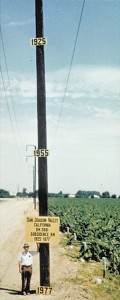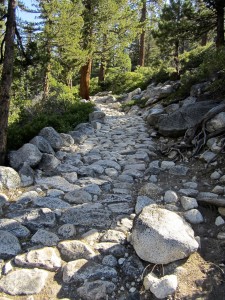I’m in the backyard with Gertrude pulling weeds out of the ground cover when I trip in a small cleft in the ground left from a dead strawberry bush I’d taken out a couple of years ago. As if surprised, I mutter ripe words to myself, and promise to fill in the hole as soon as I’m finished with the weeding. It wouldn’t have taken much to level out the hole at the time—a couple shovels full of dirt. But instead of filling in the hole, I insist on tripping in it every time I’m working out in the yard. Risking a twisted ankle. Or worse.
Gertrude’s the same way, which makes me think I’m not alone—stepping into the same familiar deep, dark hole, more than once. Realizing I’ve been here numerous times before.

In 1975, Joseph Poland documented that land in the San Joaquin Valley had sunk nearly 30 feet.
Credit: US Geological Survey
I blurt out hurtful words, cry at the most awkward moments, act as if the world revolves around me. These aren’t colossal blunders, but I wonder why I keep repeating the same missteps. Like a huge sinkhole. Peering over the edge into the depths and then blithely plunging in.
Speaking of sinkholes, during a four-year drought in the late 1980’s, in my own town of San Luis Obispo, the city began pumping groundwater. Nearby Bear Valley Shopping Center and the Honda dealership sank 12- to 24-inches in a V-shape, doors and windows cracked, grass inveigled its way through the broken concrete. The city eventually paid $3.5 million for leveling and rebuilding the dealership and the shopping center.
But we obviously haven’t learned from our mistakes. The entire central valley of California is pumping record levels of ground water for agriculture. The center of the state is sinking.
In the ultimate disconnect, we accuse adolescents of acting as if their behavior has no consequences. Putting their bodies in harm’s way. Riding their bicycles without a helmet. Drinking to oblivion. D riving too fast around a curve in the road. Engaging in unprotected sex.
riving too fast around a curve in the road. Engaging in unprotected sex.
Why, we wonder, would they put themselves at risk like that? It’s because their frontal lobes aren’t fully developed. They’re rebelling. It’s hormonal. It’s peer pressure.
Frankly, it sounds a lot like the rest of us, imagining the problems we’ve caused will solve themselves. We take our most precious, intimate relationships for granted. Blurt out unkind words. Prefer to remain unconscious in the face of overwhelming evidence that our behavior is unsustainable.
Something like tripping in a hole again and again. I wonder what it will take—to peer into the sinkhole. And then walk a different path.
I recognize that trail.
Thoughtful reflection.
Yes, it’s the trail down to Merced. We were on it for what seemed forever :-).
Elie, love this analogy! You are an amazing writer. Antarctica seems like a distant memory!:). What are your future adventure plans?
Thanks Jackie! I’ll be going to Cuba in February. It’s hard to top our Antarctica adventure. Hope you’re doing well.
We could discuss this for a very long time. Familiar thoughts.
I guess it’s just part of the issue–that we could discuss this for a very long time. :-). Thanks for your comment.
Elie: You are like fine wine, each thing you write gets better and better. So happy to be one of your
Sierra Sisters. Jean Hyduchak
Thanks Jean!
The topic of sink holes is fascinating. It’s one thing when they are natural like Eagle Creek Sink Hole in Mineral King, but another thing when man creates them by over pumping our ground water. Then there’s the sink holes we create in our personal lives. I love that photo of the trail going down to Merced camp. It brings back memories of our trek last year. I enjoy your writing.
Thanks Lynda. I kind of “fell into” the parallel of sink holes and our personal lives. The idea that we’re creating sink holes in our lives and in the landscape is more than a little scary.
You’re right. It’s easy to point fingers but difficult to take responsibility for what is our own making.
Sad, but true.